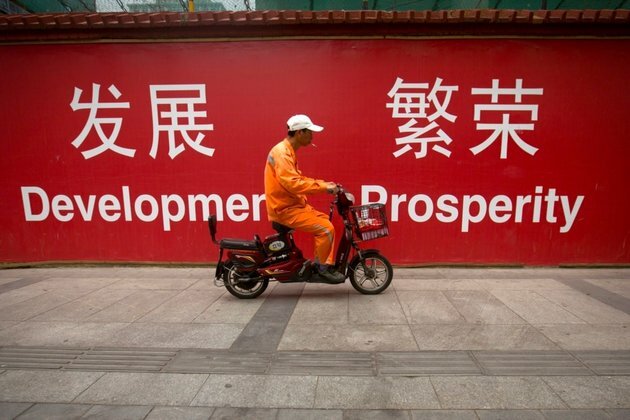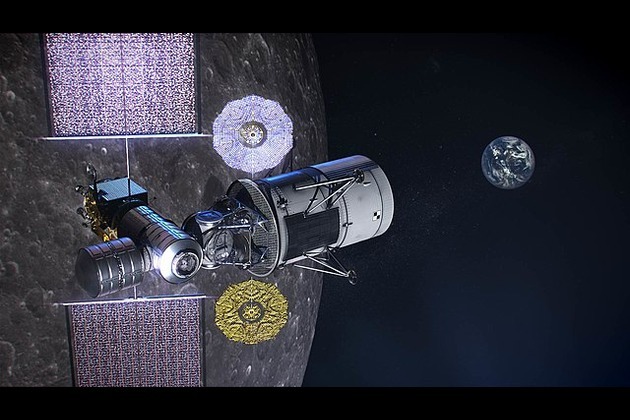Satellites Shed Light on Dictators' Lies About Economic Growth
Voice of America
01 Nov 2022, 00:36 GMT+10

London - Authoritarian regimes are significantly overstating their GDP (gross domestic product) growth, according to new research that uses satellite images of countries at night as a proxy for economic activity.
The report estimates that autocracies exaggerate yearly GDP growth by about 35% relative to democracies.
Rosier picture
The research starts from a central premise: that all leaders, whether in democracies or dictatorships, want to boast of a booming economy.
"Everyone would always want to paint a rosier picture," report author Luis Martinez of the University of Chicago told VOA. "The crucial difference is that in a democracy you have a whole network of checks and balances that restrains this behavior somewhat.
"For instance, you have the media scrutinizing the numbers. You have the opposition in the legislature also asking questions. Nowadays, in many settings we have freedom of information requests. The underlying hypothesis is that when we start looking at undemocratic regimes, these checks and balances start to become largely absent," Martinez told VOA.
Night lights
So how to measure economic growth when you can't trust the government numbers? Research indicates that satellite images showing the intensity of electric lights at night are a close proxy for economic activity.


No media source currently available
A common example is the nighttime satellite view of the Korean peninsula. Much of South Korea, a democracy, is lit up brightly. North Korea - whose economy under dictator Kim Jong-un is around 60 times smaller than that of its southern neighbor - is mostly black, the frontier clearly visible by the change in luminosity.
"As an economy develops, things get built, like infrastructure, streetlights, homes, industries," Martinez said.
Martinez used the "Freedom in the World" index produced by the non-governmental organization Freedom House as a measure of a nation's democracy. He then compared official GDP figures to the economic growth implied by the satellite images of nighttime luminosity.
"What I find is that, say, you take two countries and in these two countries the nighttime lights grow by the same amount. And it happens that one of them is more democratic than the other. It turns out that that same amount of growth in lights translates into lower reported GDP growth in the more democratic country," Martinez said.
Economic exaggeration
His study observed GDP figures and satellite data for 184 countries over 20 years, up to 2013.
The research looked at whether the type of economic activity taking place, such as agriculture or hydrocarbon extraction, would impact the intensity of nighttime lights. Martinez also investigated whether poorer data collection and reporting in autocracies could skew the results.
Even controlling for such factors, Martinez said the pattern was clear: Dictatorships overstate their GDP growth.
"When we compare the more stable, credible democracies to the more authoritarian regimes, we're talking about something in the range of 30% to 35%. What that means for instance, is that if the true growth rate is 1%, the authoritarian regime will report the growth rate of 1.3%," Martinez told VOA.
Foreign aid
Martinez said foreign aid programs also appear to influence a country's willingness to overstate its GDP, according to his satellite analysis.
"Many of the poorest countries in the world receive a lot of foreign aid. But once they reach a certain level of income - once they become rich enough - they graduate out of that program, they become ineligible.
"And so of course you can imagine that when you have a lot of money coming in because the country's relatively poor, you don't have a strong incentive to overstate growth, and to say that you're doing really well. So indeed I find that it's only once poor countries graduate and become ineligible for foreign aid, that these (patterns) start to appear," Martinez told VOA.
China
China's authoritarian leader Xi Jinping was sworn in for another five-year term last week. Martinez's model suggests Beijing may have overstated GDP growth by a third over the past two decades, making its economy far smaller than claimed.
A report published by the Brookings Institution in 2019 suggested that China had been overstating its economic growth by about 2% every year, making its economy 12% smaller than official figures then claimed.
China denies manipulating economic data.
Beijing delayed the release of its 2022 third quarter growth figures without explanation, coinciding with the Communist Party congress. The figures were eventually released in late October, claiming year-on-year quarterly growth of 3.9%, exceeding analysts' forecasts.
 Share
Share
 Tweet
Tweet
 Share
Share
 Flip
Flip
 Email
Email
Watch latest videos
Subscribe and Follow
Get a daily dose of North Korea Times news through our daily email, its complimentary and keeps you fully up to date with world and business news as well.
News RELEASES
Publish news of your business, community or sports group, personnel appointments, major event and more by submitting a news release to North Korea Times.
More InformationInternational
SectionHuman traffickers exploit new deadly route from Africa to Europe
DERA BAJWA, Pakistan: Amir Ali, a 21-year-old man from Pakistan, dreamed of going to Europe for a better life. He was promised a visa...
ispace lander crashes on moon; Japan faces new lunar setback
TOKYO, Japan: Japan's hopes for a foothold in commercial lunar exploration suffered a second blow this week after Tokyo-based startup...
FSB claims Russian professors linked to British Council espionage
MOSCOW, Russia: Russia's principal security agency, the Federal Security Service (FSB), has accused British intelligence of using the...
Australian PM rejects US pressure to ease biosecurity rules
SYDNEY, Australia: Australia will not ease its strict biosecurity rules during trade talks with the United States, Prime Minister Anthony...
Flotilla ship prevented from reaching Gaza, passengers and crew detained
The Israeli Navy has intercepted a ship carrying humanitarian aid and a number of activists including Greta Thunberg, Rima Hassan,...
Japan’s 2024 birth rate drops below 700,000 for first time
TOKYO, Japan: Japan's demographic challenges intensified in 2024, with the number of births falling to another all-time low—underscoring...
Business
SectionNasdaq Composite climbs 124 points on China-U.S. trade talks optimism
NEW YORK, New York - U.S. stock markets rose Tuesday as investors and traders anticipated a positive outcome from ongoing trade talks...
Beijing approves rare earth shipments to top three US automakers
BEIJING/WASHINGTON, D.C.: In a rare move aimed at easing mounting supply chain pressure, China has issued temporary export licenses...
UBS faces $26B capital demand under Swiss post-crisis plan
BERN, Switzerland: UBS faces a sweeping new capital requirement from the Swiss government, which this week proposed changes that could...
Inside the viral world of Walmart’s high-paid cake artists
NEW YORK CITY, New York: At a Walmart Supercenter in New Jersey, buttercream borders and edible-ink cartoons aren't just about sweet...
U.S. stocks directionless, although Nasdaq Composite adds 61 points
NEW YORK, New York - Wall Street delivered a split performance on Monday, with the Nasdaq Composite notching up gains while the Dow...
Kering eyes partial sale of Fifth Ave building to cut debt
NEW YORK CITY, New York: Luxury group Kering is in exclusive discussions to sell a stake in its prime New York real estate asset on...













